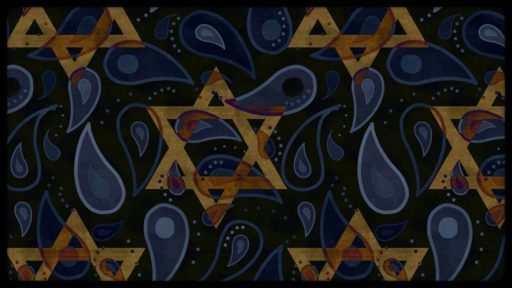I’m lucky. My father died on the 14th of Av, 5781 (July 23, 2021). He was 94. Until he died, I was alone—the only one among my close friends with two living parents. I’m no longer alone.
On the drive back from New Jersey to North Carolina two days after his passing, I remember: Leon Wieseltier’s Kaddish. I’ve owned it for twenty years. It’s one of those books that, when I purchased it, I felt I needed to read. I was the director of a small Center for Jewish Studies. And I was a poet, a Jewish poet. I needed the knowledge. Further, the book might inspire a poem. And, who knows, maybe it would even nourish my spiritual life. Kaddish has sat on a bookshelf unread since I slid it into its space on the shelf, and I hadn’t even thought about it until now, now that I was my father’s “kaddish.” (The oldest son is commanded to say kaddish for a deceased parent.)
I’ve said kaddishes for my entire adult life: the half kaddish, the whole kaddish, the rabbi’s kaddish, even, occasionally, the mourner’s kaddish—for those who have no one to say mourner’s kaddish for them. And, of course, Ginsberg’s “Kaddish,” a long poem for his mother, Naomi, 1894-1956.
Strange now to think of you, gone without corsets & eyes, while I walk on the sunny pavement of Greenwich Village.
downtown Manhattan, clear winter noon, and I’ve been up all night, talking, talking, reading the Kaddish aloud, listening to Ray Charles blues shout blind on the phonograph
the rhythm the rhythm…
Yes, its distinctive rhythm, yitgadal v’yitkadash sh’mei raba…
The clean strike of each stressed syllable followed by the glide of a couple or few quiet syllables. My body knows kaddish.
The words are Aramaic but close enough to Hebrew for me to mostly know them, too. Still, I have almost always intoned the prayer in a rote manner, distractedly. The words never spoke the language of my heart.
Even the first time, after lighting the shiva candle, I said the kaddish as a mourner, together with my mother, wife, brother, and sister-in-law, my parents’ Reform rabbi of decades leading us, the words were just words, nothing more. If I am going to honor and remember my father by saying kaddish for eleven months, I need to find a way for the prayer to become more than just its rhythm, its music. So I’ve been reading, studying.
During the eleven months that he dutifully said the mourner’s kaddish three times a day for his father, Wieseltier “set out in search of the history of the mourner’s kaddish.” The book, Kaddish, is the journal he kept throughout that period in which he recorded the ancient, medieval, and modern sources he consulted. Following the preface, the book begins with Wieseltier’s translation of the prayer itself.
The prayer begins:
Yitgadal v’yitkadash sh’mei raba b’alma di-v’ra chirutei
In the prayer book I commonly use, the Conservative movement’s Lev Shalem (A Whole Heart or Heartfulness), the words are translated like this:
May God’s great name be exalted and hallowed throughout the created world, as is God’s wish.
Wieseltier’s translation, on the opening pages of his book, begins:
Magnified and sanctified
may his Great Name be
in the world that He created,
as He wills
From the created world to the world that He created. There it is. Language that awakened mind and heart. With that translation, my world, diminished by the loss of my father, expanded. I knew myself and my father—the fullness of his life, the definitiveness of his death (I kissed his cold forehead where he lay in the funeral home)—to be a part of “the world that He created, as He wills.” This birth, this life, this death: it’s not personal.
Yet, it is personal. In the eyes of the Jewish community, I am now a mourner—set apart. I feel it when I stand in synagogue for mourner’s kaddish. There are only a few of us who stand for it: those whose losses are recent, those who are marking an anniversary of a death. But we stand, we mourners, in community. It’s personal, but my mourning doesn’t belong to me alone.
In Kaddish, Wieseltier writes about sitting in his late father’s place in shul, synagogue, on Erev Roshanah, the evening of Rosh Hashanah.
I come to shul, his grandiose shul, and slip into his seat. Tremors, instantly. He was in this place, now I am in this place. It was his place, now it is my place.
… … …
The prayers end and the congregation files out. In the corridor a gentleman approaches me and says: ‘Have a good year, Mr. Wieseltier.’ I am a little discomfited. I am not Mr. Wieseltier. He was Mr. Wieseltier. In a way, this marks the end of shul as I have known it. All my life I went to shul with my father, that is, I went to shul as a son. It was because I found it almost impossible to stop going to shul as a son that I stopped going to shul. I came to conflate religion with childhood. But childhood is over. And so Mr. Wieseltier returns the greeting: ‘And a good year to you, too.’
My father’s memorial service (my parents don’t follow many of the Jewish traditions of death and burial) will be held on the 26th of Elul, Sept. 3, just a few days before Erev Rosh Hashanah. Even if I lived in South Jersey, even if I were a member of Temple Emanuel, my parents’ temple, I would not have to experience the discomfort of sitting in my father’s place. My father didn’t have a fixed place in his synagogue. He wasn’t much of a synagogue goer.
His seat was in his apartment, a black, leather wing-chair where he sat reading the Philadelphia Inquirer, watching the stock market, nightly news, Jeopardy, classic films, and Law and Order, telling me stories, endless stories, of his family and friends. The living room is quiet now; the chair empty. I don’t think I will be able to bring myself to sit in it when I’m back there for the service and to spend a few days with my mother. His place in the world now is in my memory, in my heart. With him and without him, I take my place in the world by saying mourner’s kaddish as I enter the new year which Rosh Hashanah celebrates.
Richard Chess directed the Center for Jewish Studies at UNC Asheville for 30 years. He helps lead UNC Asheville’s contemplative inquiry initiative. He is a board member for the Center for Contemplative Mind in Society. He’s published four books of poetry, the most recent of which is Love Nailed to the Doorpost. You can find him at http://www.richardchess.com





